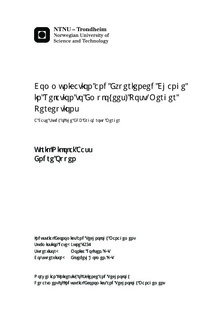Communication and Experienced Change in Relation to Employees' Post-Merger Perceptions: A Case Study of the EDB ErgoGroup Merger
Master thesis
Permanent lenke
http://hdl.handle.net/11250/266294Utgivelsesdato
2012Metadata
Vis full innførselSamlinger
Sammendrag
While mergers and acquisitions continue to be a popular path for companies in the 21st century, research suggests that they frequently fail to deliver the expected value, and that this often is due to complex human-related issues in the integration process. This thesis aims at understanding the challenges faced by merging companies, with a focus on the factors contributing to employees’ satisfaction with work-life post-merger. This has been investigated both theoretically and empirically through the topics of change content, employees’ approach to change, and communication. The methodology applied in this research was an embedded case study, with the Norwegian IT company EVRY as the main case. Within EVRY, three subcases representing three different business units were investigated. The collected evidence included documentation, results from employee satisfaction surveys, and interviews with high-ranking executives, middle managers and employees. The topics of the framework that was developed, and the interrelations between them, were found to significantly affect how employees perceived their work-life, with factors both increasing and decreasing satisfaction. The analysis of empirical findings materialized in a discussion where several important implications were brought forth. First, it was shown how merging companies must ensure that communication is adapted to the change content faced by each unit, and second, that the focus of top management can be detrimental to how they are assessed by employees. Third, it became evident that communication will play a vital role in creating perceptions of equality between the merging companies, and fourth, that the changes employees are subjected to will influence how they want to be involved in the merger integration process. During the empirical investigation, a fifth topic that was not part of the framework arose as particularly important to employees. This concerned how the change process was facilitated, and demonstrated how merging companies must be aware of the sequence in which changes are implemented, the speed of the change process, and that all changes must be followed by adaptations of the organization.
